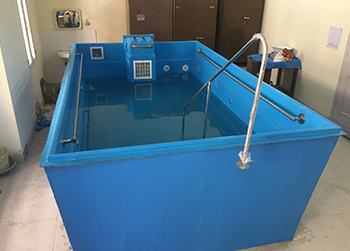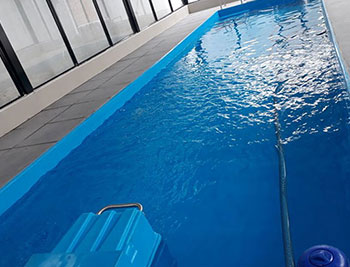How to Find the Best Fiberglass Swimming Pool...
If you are investigating the idea of an in-ground pool, you will find that some pool builders offer you a choice of either concrete or fiberglass. Figuring out what type of pool is going to suit your needs best might seem like a daunting decision at first. In this article, we’ll take a look at the advantages and disadvantages of both options to help you in your decision making. Get ready to make the first step in the quest for the best pool for you: Deciding for the fiberglass or concrete option.
What are the Benefits of a Fiberglass Pool?

-
They are quick to install: One great thing about fiberglass pools is that most of the work is done in the factory before your pool arrives on site. A standard installation can typically be completed in a week or two, whereas concrete pools will typically take several weeks, if not months to complete.
-
Fiberglass pools have a visually appealing surface: Some fiberglass pool manufacturers (including Arrdev Pools) have invested a great deal of time and resources into creating stunning pool surfaces that truly enhance the over-all look of the pool.
-
They are easy to look after: The smooth gelcoat surface on a fiberglass pool makes it much easier to control against algae and bacteria growth. Because of this, fiberglass pools are easier and generally less expensive to keep clean and healthy (less work and fewer chemicals). This can be a big plus in your “best pool for me” checklist.
-
They require very little ongoing care: Unlike some pool surface finishes, high-quality fiberglass pools should not need resurfacing during their lifetime. In most cases, all that is required is basic care in accordance with the manufacturer’s guidelines to keep in good condition.
-
Fiberglass pools seem warmer: Many existing pool owners who have owned both types of pools report that fiberglass pools are warmer. Check out online forums where multiple
-
Indian-based users state that the than concrete and retain heat for longer. Surely, this is another argument why many people vote for fiberglass as the best pool technology.
-
Fiberglass is an incredibly durable building material: These days most fiberglass swimming pools manufacturers make a reliable product and offer lengthy warranties to back them up. Fiberglass is a super-tough material which means that quality-manufactured fiberglass pools get the benefit of being both strong and flexible at the same time. Arrdev Pools offer added strength, durability and chemical resistance with its patented ceramic composite technology (more on this in the final section of this article).
What are the Downfalls of a Fiberglass Pool?
-
Shape/size limitations: Because all fiberglass swimming pools are made on a factory mould rather than onsite, you can only choose from the pre-determined shapes that the various manufacturers provide. The sizes and shapes are further limited (particularly in width) by the fact that they need to be transported by road. The widest swimming pool supplied by Arrdev Pools for example is 3.5m in width. If you select our X-Trainer swimming pool shape, for example, you have 3 models that are 3.5m wide to select from: 6m , 7.5m and 9 m. Most manufacturers have a pretty diverse range of shapes and sizes available and the majority of the time you can easily find what you’re looking for. Many Compass dealers also offer a unique customization service allowing additional swim-outs, beach entries and lounge areas to be built into the pool design.
What are the Benefits of a Concrete Pool?
-
Flexibility with design: The one obvious benefit is that you can build a concrete pool to match any shape or design you have dreamed of. And because concrete pools are made on-site, your pool builder can adjust your design exactly to suit your site.
-
Aesthetics: New concrete pools tend to look very appealing, and there are a range of surface finishes available from pebble to tile, depending on your preferences and budget.
-
Strong: It’s fair to say that concrete pools have been around a long time and that from a structural point of view they are reliable and strong.
What are the Downfalls of a Concrete Pool?
-
They can take a lot longer to build: It can take several months of onsite work to complete the construction of your concrete pool, whereas other options can be finished in a few weeks or less.
-
Concrete options can be more costly to build: Concrete pools can quickly become complex in design and it does not take long for costs to grow.
-
Many popular surface finishes are rough under foot: One common complaint of concrete pools is that they can be rough on bare feet and can cause grazes and scrapes – especially for kids who like to rough and tumble in the pool.
-
They can cost more to run on a daily basis: Concrete surfaces are often porous, allowing them to absorb water and become the ideal breeding ground for algae and bacteria to grow. Owners of these concrete pools typically spend more time and money keeping their pools healthy and safe to swim in.
-
Concrete pools are generally more susceptible to black algae: Where a black alga has attached itself to pores in the pool surface, it can prove very difficult to completely eradicate.
-
They can require expensive up-keep over the long term: Concrete pools require ongoing care and maintenance and in some cases will need to be reconditioned after fifteen years or so, depending on the type of surface finish used.
Are All Fiberglass Pools the Same?

Because of all the benefits of fiberglass pools, they are the number one option for many pool buyers looking for the best swimming pool. But are all the fiberglass pools the same? The short answer is no. Few manufacturers in INDIA make reliable and long-lasting products but a few have significant differences which make them stand out from the rest. One such difference is the use of ceramic composite technology. This innovative technology was first developed and patented by Arrdev Pools in the mid-2007 and is used in all its pools supplied across the Arrdev dealer network. If looking for the best fiberglass swimming pool, you should definitely consider having a high quality swimming pool with ceramic composite technology.
Arrdev Pools pioneered ceramic composite technology by mixing super-strong ceramic micro-spheres into vinyl-ester resin and then applying this mixture to create a super-tough and chemically resistant core in the pool shell. This core gives the Arrdev pool even greater durability, making it ideally suited to cope with the full range of soil conditions (which can affect seasonal ground movement) and severe weather events (which can affect groundwater pressure).
Which is Better – You Decide!
When you compare the list of pros and cons of concrete and fiberglass pools, it’s not surprising to discover that more than half of all in-ground pools installed in Australia today are fiberglass pools, which represents a significant increase in market share over the last 30 years. Modern fiberglass pools offer an amazing range of shapes and sizes, durability, good looks and can be easier and more cost effective to look after (over the long term) than concrete pools. Compass fiberglass ceramic pools also come with industry-leading warranty protection and the option of the exclusive Vantage in-floor system. Compass Pools authorized dealers have built some of the best pools in Australia rewarded by many highly recognized awards. Many of these awarded pools are shown in our pool gallery where you can explore some of the best pools installed. Concrete pools on the other hand, tend to give you more flexibility when it comes to design and can include premium tile finishes where the budget allows. Some concrete pool builders also offer in-floor cleaning and circulation systems.